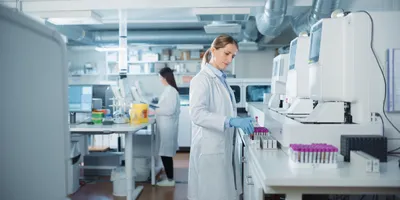Clinical lab operations may not grab headlines, but they’re the backbone of reliable diagnostics and research support. Thad Gurley, clinical virology operations manager at ViiV Healthcare, walked through the essentials of clinical lab ops during a session at the 2025 Lab Manager Leadership Summit. His experiences reveal how funding, purchasing, equipment management, and program oversight form an interconnected chain. Each link matters—ignore one, and the whole system can falter.
Securing the funds
Clinical research cannot function without stable funding streams, but not all money comes with the same expectations. When Gurley worked as a lab manager at the Duke Vaccine Institute, he relied heavily on grants from the National Institutes of Health. These grants were vital for funding lab ops, paying for equipment, maintenance/repair, and more. But grants aren’t the only option for funding, so Gurley emphasized that lab managers must understand how different streams work. “A grant is going to be an assistance mechanism to support research for the public good, whereas a contract is going to be a legally binding agreement to acquire goods or services for the direct use and benefit of the government,” he explained.
Grants typically allow more flexibility and are peer-reviewed based on broad criteria. Contracts, in contrast, involve more government oversight and stricter deliverables. Navigating these differences is crucial because labs must match funding mechanisms to their operational needs.
Purchasing wisely
Once funds are secured, the next challenge is purchasing equipment and consumables. Gurley described the variety of tools labs might use—from institutional procurement platforms to on-site storerooms and corporate cards. But he argued that the relationships built with vendors are just as important as the systems themselves.
He recalled the early months of the COVID-19 pandemic, when Duke needed to quickly scale up testing capacity. Supplies were scarce, but long-standing vendor connections helped the lab secure what it needed. For him, trusted sales representatives are not just suppliers but partners who can help labs respond to crises.
Beyond the price tag
Purchasing is only the beginning. Every piece of equipment carries ongoing costs that can surprise those who fail to plan ahead. Gurley used Duke’s liquid nitrogen freezers as a case study. A single unit might cost $34,000 up front, but the bills do not stop there. Preventive maintenance and repairs add thousands more each year.
Gurley urged managers to budget for these realities when writing grant proposals and allocating funds. Preventive maintenance may feel optional in the short term, but over time it protects samples, avoids downtime, and prevents much larger losses.
The role of program management
No lab manager works in a vacuum. Lab ops are a collaborative effort. For Gurley, program management is the connective tissue that links research goals with operational logistics. Program managers at Duke help coordinate multiple projects, allocate resources, and keep budgets balanced across a portfolio of grants and contracts.
When the Duke lab needed to purchase another freezer, Gurley worked with program managers to divide the cost strategically. “We decided we were going to put 25 percent on the civics contract, 25 percent on the influenza vaccine grant, 25 percent on the syphilis vaccine grant, and 25 percent on the bioforce grant,” he said. This approach lightened the burden on any single project and ensured each grant paid only for the portion of storage it would actually use. For labs juggling diverse projects, program management provides a framework for these kinds of solutions.
More than just science
Laboratories do not succeed on scientific expertise alone. Operational competence—managing the dollars, the equipment, and the processes—is just as vital.
Clinical lab ops may never be glamorous, but it is indispensable. From the moment funds arrive to the day an experiment produces results, every step relies on systems that someone has carefully put in place. Gurley’s perspective makes clear that labs that invest in strong ops are the ones best positioned to thrive, no matter what challenges come their way.
Note: This article was created with generative AI.














